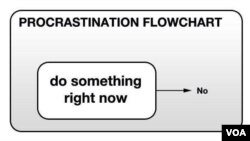Server error
Oops, as you can see, this is not what we wanted to show you! This URL has been sent to our support web team to the can look into it immediately. Our apologies.
Please use Search above to see if you can find it elsewhere
querystring="?embed_html=src%3A%3A%2F%2Fgiphy.com%2Fembed%2FSsUnirNjTGvFm%7C%7Cwidth%3A%3A261%7C%7Cheight%3A%3A480">
Giphy Embed ImageWhich kind of student are you? Today is Monday, and you have a test on Friday. So you start to study:
A) Thursday ... night.
B) Friday ... morning.
Many of us wait until the last minute to produce. (Who does NOT procrastinate?) Maybe you do not like to study, or you become distracted easily. Social media is always only one screen swipe away.
What are some ways to help you stop procrastinating? It's all in the timing, says Francesco Cirillo. He created the Pomodoro technique in the 1980s when he was a college student by using a timer to help him focus on his school work. (The timer was shaped like a pomodoro, the Italian word for tomato.)
Here's his secret.
- Set a timer for 25 minutes and work on a task until the timer rings.
- Take a short break -- around five minutes -- then reset the device.
- After several 25-minute study sessions, take a longer break from 15 to 30 minutes.
Cirillo suggests recording the number of sessions you complete. He also suggests getting organized and planning for future study sessions so that you can complete the most important work first.
The important point of this method is to help you focus and stop postponing work.
Procrastination and language learning
Procrastination, says Barbara Oakley, is one of the biggest issues in language learning.
Oakley is the creator of a popular Massive Open Online Course, or MOOC, called "Learning How to Learn."
Oakley, a professor of engineering, also has years of experience in language learning. She studied Russian and worked as a translator on a ship when Russia was part of the Soviet Union.
Cirillo's technique, she says, is the best way to help overcome procrastination.
Oakley suggests turning off distractions while you study, such as a cell phone. The important part about the technique is to train your brain to enjoy learning.
"And when you are done, give yourself a little reward. Listen to a song you like, or get up and move around or chat -– you know, just some kind of reward," Oakley says. "And that reward will help wire your brain so it more enjoys the actual process of learning."
The next time you study, give the Pomodoro technique a try. Set a timer for 25 minutes and focus as much as possible. Then reward yourself. Have something to eat or drink.
Use the timer on your phone, find free timers on the Internet, or use an old-fashioned timer from the kitchen. What is important is that you avoid distractions and train your mind to enjoy learning.
Let us know how it works for you.
Please leave a comment here, and visit us on Facebook, Twitter, Instagram and LinkedIn, thanks!






